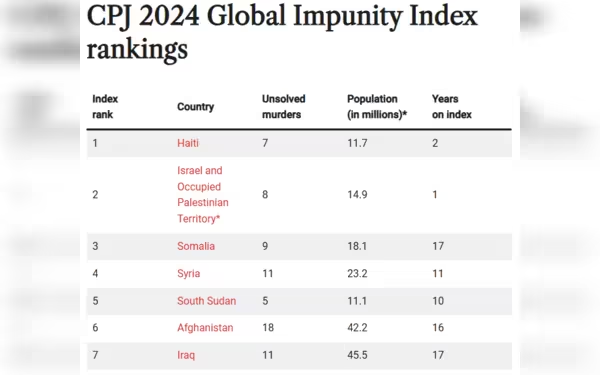Thursday, November 7, 2024 01:26 AM
Gaza Conflict: Journalists Under Siege and the Call for Justice
- 1,625 journalists killed since 1992, with less than 20% justice served.
- Israel ranks in CPJ’s 2024 Global Impunity Index for the first time.
- Over 130 media workers killed in Gaza amidst ongoing violence.
 Image Credits: dawn
Image Credits: dawnThe ongoing Gaza conflict highlights the dangers faced by journalists, with alarming statistics on killings and impunity.
The ongoing conflict in Gaza has drawn international attention, particularly regarding the safety of journalists working in war zones. Since 1992, the Committee to Protect Journalists (CPJ) has been documenting the tragic killings of journalists, with a staggering total of 1,625 names recorded. Out of these, 974 confirmed murders have been noted, yet less than 20% of these cases have seen justice served. As we observe the International Day to End Impunity for Crimes Against Journalists, it is crucial to highlight the alarming statistics that place Haiti and Israel among the worst offenders in allowing the murderers of journalists to evade punishment.
This year marks a significant moment as Israel appears for the first time in CPJ’s 2024 Global Impunity Index. The targeted killings of five journalists in Gaza and Lebanon since the outbreak of war in October 2023 have contributed to this ranking. The index serves as a grim reminder of the dangers faced by journalists, with over 130 media workers reported killed amidst the chaos in Gaza. CPJ is currently investigating the potential targeted murders of at least 10 additional journalists, indicating that the actual number may be even higher.
Governments possess the tools necessary to combat this troubling trend. Recently, South Africa submitted a memorial to the International Court of Justice (ICJ), presenting evidence of the Israeli government committing acts of genocide against Palestinians in Gaza. Although the memorial is sealed, some evidence has been detailed in a report titled "A Spatial Analysis of the Israeli Military’s Conduct in Gaza since October 2023" by Forensic Architecture, a research agency based at Goldsmiths, University of London. This extensive report, comprising 827 pages, outlines Israel’s military actions in Gaza, suggesting that the military campaign is systematic and aimed at destroying essential infrastructure.
In addition to official reports, newsrooms are collaborating with agencies to utilize open-source information to narrate the stories of those who have lost their lives. One notable investigation, "The Killings They Tweeted: An Airwars Investigation," represents a significant public analysis of Israeli military strike footage. This collaboration between the UK’s Sky News and transparency watchdog Airwars reveals a different narrative than the one presented by the Israeli Defense Forces (IDF). The investigation geolocated over 70 strikes, with 17 incidents resulting in civilian harm, leading to the reported deaths of more than 400 civilians.
The targeting of journalists is not a new issue. In May 2022, Al Jazeera journalist Shireen Abu Akleh was killed while covering a story in the West Bank, and calls for a criminal inquiry were dismissed by Israel. More recently, Reuters video journalist Issam Abdallah was killed, and six other journalists were injured in southern Lebanon, despite being clearly marked as press. The World Association of News Publishers (WAN-IFRA) condemned the killing of three journalists in a known press compound, urging for an independent investigation into whether they were deliberately targeted.
As we reflect on the events surrounding the #EndImpunity Day, the International Federation of Journalists (IFJ) has publicly condemned Israel for what it describes as "the bloodiest period in the history of journalism." The IFJ has called for the lifting of the ban on international journalists in Gaza and accused Israel of violating UN Security Council Resolutions that protect journalists during armed conflicts. The situation remains dire, and it is imperative for the global community to advocate for the safety of journalists and hold accountable those who perpetrate violence against them.
The plight of journalists in conflict zones like Gaza underscores the urgent need for accountability and justice. As the world watches, it is essential to support efforts that aim to protect the rights of journalists and ensure that their voices are not silenced. The fight against impunity is not just a battle for journalists; it is a fight for truth and transparency in a world where information is vital for peace and understanding.













